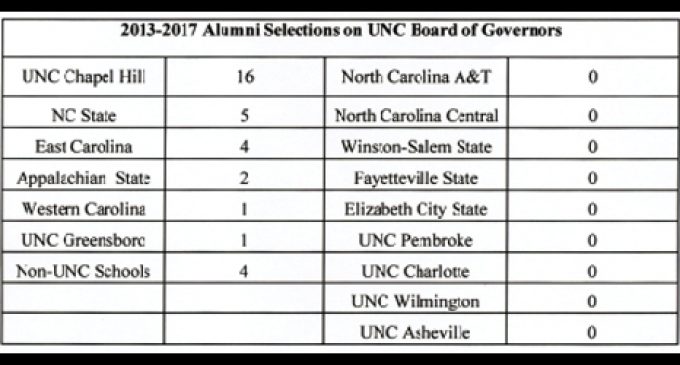HBCU alumni missing from BOG

On July 1, when newly elected members of the UNC Board of Governors begin their four-year term, pay close attention to the blatantly unbalanced selections made.
For the first time in many years, there is a lack of representation from historically black colleges and universities (HBCUs), African-American women and Democrats in the selections made by the GOP-dominated NC General Assembly.
Our state university system, which prides itself on its five historically black universities, will have its least diverse Board of Governors in recent history. Statutory provisions required at least two minority race members, minority political party members and two women, but that provision was repealed in 2001 after legal challenges. However, the Democratic majority always ensured the election of women, HBCU alumni, Republicans, African Americans and Native Americans.
In 1971, legislation was established to incorporate HBCUs into the University of North Carolina system; and in 1972, the first Board of Governors was appointed to govern and oversee the development of a well-planned and coordinated system of higher education, to improve the quality of education, to extend its benefits, and to encourage an economical use of the state’s resources. This mission will have difficulty being accomplished without input from the significant and diverse components of the UNC system. Although HBCUs serve diverse populations, they remain the gateway to a promising future for African Americans. These institutions provide access to some modicum of equity in careers and transforming dreams into realities.
While the Board of Governors will only include five Caucasian women, the absence of African American participation speaks volumes during a time when African American women represent a significant percentage of the college demographic, and equation for economic recovery within their communities. At the encouragement of the GOP Senate majority, an eligible African American woman candidate was recruited, and while she was the only candidate with HBCU affiliations included on the final ballot in both chambers, the majority refused to elect her. However, on a positive note, the GOP did elect two African-American Republican males who are graduates of UNC-Chapel Hill and North Carolina State University.
The impact of these decisions, if not the intent, is to assign less value to, and restrict the contributions of, African-American women and HBCU alums committed to higher education in this state. These decisions set in place a cascading effect that denies access at the governance, education and economic levels. This lack of inclusion will have a negative impact on decisions regarding HBCUs, selection of trustees, programming, budgets and other administration approvals. The outsider position for HBCUs in relation to the board is exacerbated by the exclusion of African-American women and Democrats who are likely to foster relationships and affiliations with these institutions. This steadily declining participation is certain to forecast trouble in the days ahead.
How will the voice of the HBCU community be heard at the governance table?
We are issuing a challenge to Republican leadership, Board of Governors, UNC President, historically white campuses, and HBCUs to take proactive, aggressive steps towards resolving this discriminating exclusion. The Republican majority should fill any vacancies on the board with persons possessing a strong HBCU affiliation. University leaders must create every opportunity for influential HBCU alumni to be represented on decision making committees, provide input and have timely access to critical information.
It is time for HBCU alumni to become more vocal than ever with the General Assembly and members of the Board of Governors regarding the way decisions impact their institutions as a vital component of the university system. The UNC Board of Governors presides over a historical and varied campus system uniquely designed to serve North Carolinians from ALL racial, political, regional and economic backgrounds. It is our job to broaden the diverse, bipartisan culture that seems to have diminished within the Board of Governors. It is a job at which we cannot, and must not fail.
Sen. Gladys Robinson served as a UNC Board Member from 2000-2009 and Sen. Angela R. Bryant served as a UNC Board Member from 1999-2003.











